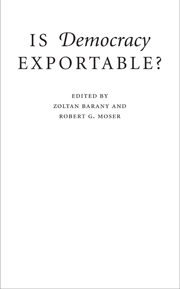Book contents
- Frontmatter
- Contents
- Contributors
- Acknowledgments
- Introduction
- A MORAL IMPERATIVE?
- STRUCTURAL PRECONDITIONS
- INSTITUTIONS AND PROCESSES
- 6 Electoral Engineering in New Democracies: Can Preferred Electoral Outcomes Be Engineered?
- 7 Does It Matter How a Constitution Is Created?
- 8 Building Democratic Armies
- 9 Democratization, Conflict, and Trade
- 10 Exporting Democracy: Does It Work?
- Conclusion: Is Democracy Exportable?
- Bibliography
- Index
6 - Electoral Engineering in New Democracies: Can Preferred Electoral Outcomes Be Engineered?
Published online by Cambridge University Press: 05 June 2012
- Frontmatter
- Contents
- Contributors
- Acknowledgments
- Introduction
- A MORAL IMPERATIVE?
- STRUCTURAL PRECONDITIONS
- INSTITUTIONS AND PROCESSES
- 6 Electoral Engineering in New Democracies: Can Preferred Electoral Outcomes Be Engineered?
- 7 Does It Matter How a Constitution Is Created?
- 8 Building Democratic Armies
- 9 Democratization, Conflict, and Trade
- 10 Exporting Democracy: Does It Work?
- Conclusion: Is Democracy Exportable?
- Bibliography
- Index
Summary
Competitive elections are the lifeblood of democracy. Indeed, the subfield of democratization remains strongly influenced by the theoretical formulations of Robert Dahl and Joseph Schumpeter, which define democracy largely in terms of competitive contests for votes to occupy public office (Dahl 1971, 1989, 1998; Schumpeter 1976). Even scholars wary of the so-called “electoralist fallacy” equating elections with democracy (Schmitter and Karl 1991; O'Donnell 1994, 1998) do not imagine that democratization can take place without instituting competitive elections at some point. Consequently, competitive elections are a centerpiece of democratization efforts and are seen by many as an end in and of themselves – as showcased in the American-led campaign in Iraq.
Despite this essential connection between elections and democratization, the introduction of elections also poses significant risks to prominent domestic and foreign political players. As Carles Boix notes, elections represent regular opportunities for society to rewrite the rules of the game and consequently threaten those who benefit from the status quo (Boix 2003). Competitive elections not only pose a threat to entrenched elites, but also may threaten Western interests and undermine political stability in general. Thus, the idea of electoral engineering entails using electoral rules to fashion elections that will produce those benefits associated with democracy, whereas reducing the degree of possible negative consequences that may arise from their introduction (Reynolds 2005). Although there is a mountain of scholarly work on the myriad effects of electoral systems, scholars have devoted considerably less attention to other forms of electoral engineering.
- Type
- Chapter
- Information
- Is Democracy Exportable? , pp. 131 - 154Publisher: Cambridge University PressPrint publication year: 2009
- 4
- Cited by



